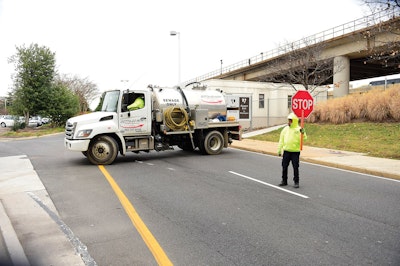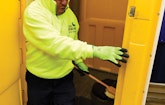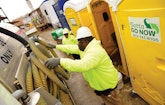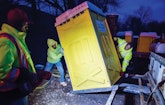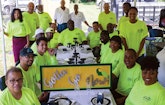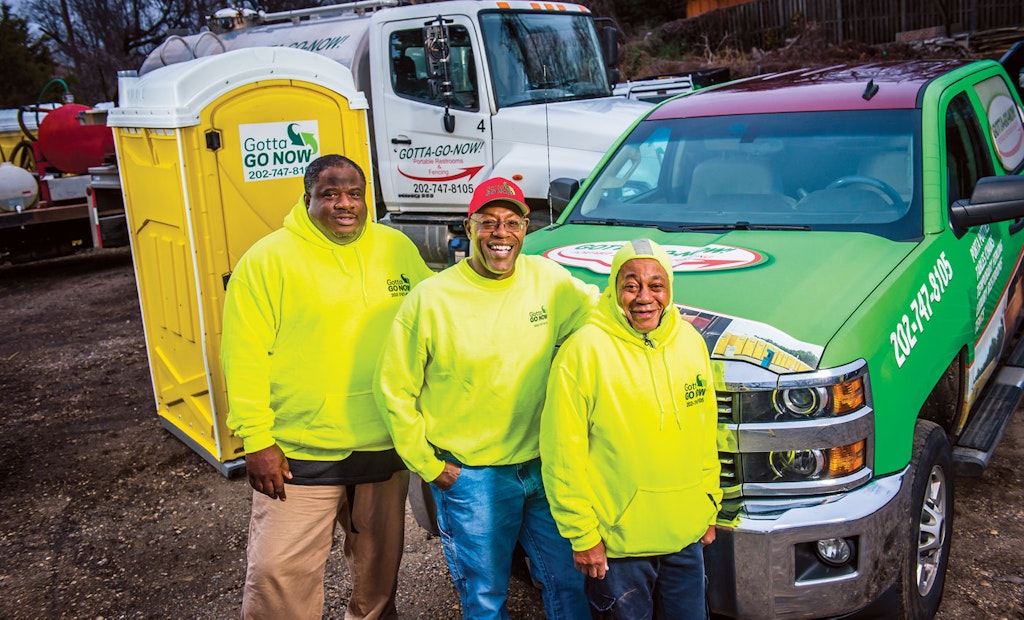
Fred Hill III, center, is photographed in the yard with crew members Clinton Lewis, left, and Teddy King. (Photos by David Sinclair)
Interested in Portable Sanitation?
Get Portable Sanitation articles, news and videos right in your inbox! Sign up now.
Portable Sanitation + Get AlertsJust six years ago, portable sanitation company Gotta Go Now had just one employee — owner Fred Hill III — and 10 restrooms. Today the business is a large independently owned portable restroom company in Washington, D.C., with 2,500 restrooms, 28 full-time employees and a large roster of equipment.
A multipronged strategy led to this dramatic transformation: a sharp U-turn from construction rentals to special-event services; an emphasis on clean restrooms aimed at differentiating the company; continual investments in equipment that made Gotta Go Now a one-stop shop for special-event clients; and a strong focus on customer service.
Along the way, Hill has rubbed shoulders with former President Barack Obama, Jay-Z, Beyoncé and other celebrities. He’s also supplied restrooms for high-profile events such as the Marine Corps Marathon, Washington Redskins games, major concerts and presidential inaugurations.
“If you would’ve told me 20 years ago that this is what I’d be doing today, I would’ve said you’re crazy,” says Hill, 56. “I have no college education, just really good business mentors in my father, Frederick Hill Jr., and my grandfather, James Contee III.
“They taught me to not be afraid to stretch out and take calculated risks … to always look out for new business opportunities and just be different from everyone else,” he adds. “They also warned me about getting too comfortable.
“Change is either going to happen to you or for you, and I want it to happen for me,” he concludes. “When it happens to you, sometimes you’re not ready.”
HUMBLE BEGINNINGS
Hill was ready when opportunity knocked in 2006. While working at a government job, he bought several used portable restrooms to place at various properties he was rehabbing and flipping as a part-time side job.
“Shortly after that, I ordered 10 brand-new units, thinking it might be an interesting part-time gig,” he says. “Then the economic downturn really hit the housing market, so I thought, ‘I’m going to see what these port-a-potties can do.’ I think it was an $859 million-dollar industry at the time, and I figured if I could carve out a little piece of that, I’d be OK.”
Word-of-mouth referrals helped him gain clients, but what really kick-started the business was a visit to the 2011 Pumper & Cleaner Environmental Expo trade show (now called the Water & Wastewater Equipment, Treatment & Transport — or WWETT — Show).
“I was blown away,” he recalls. “I was like a kid in a candy store. I left that show on fire with every intent to see how far I could go with this business. I developed a serious business plan, and within a year, I was making more money from renting restrooms than I was from my government salary.
“I told my wife, Renita, that I was going to do this full time,” he adds. “She said, ‘You don’t know anything about running a port-a-potty business.’ But within the first year, I’d bought 165 more restrooms. I was on my way.”
To boost brand- and name-recognition, Hill started buying used yellow restrooms. During the company’s early years, he scoured the Atlantic Coast from New Jersey to Georgia for restroom companies selling yellow restrooms.
“I kept finding smaller companies that were going out of business and bought restrooms from them,” he says. “I liked yellow because (construction) superintendents liked how easy they were to see on job sites. Plus, no one else had yellow restrooms, so it contributed to brand recognition.”
STRENGTH IN NUMBERS
Hill gives a lot of credit for his growth to people he met at Pumper shows. In particular, he cites Deric Boggs and Sara Brownlee. The couple used to work at a restroom manufacturing company but are now the managing partners of Drain-Pro NC, a portable restroom, septic pumping and grease trap cleaning outfit in Charlotte, North Carolina.
“They also put me in contact with different people from around the country,” Hill says. “I was so surprised how open people were about sharing information. I don’t think you see this kind of cooperation in other industries.”
Continually plowing profits back into the company was also crucial to Hill’s success. “During my first 10 years, I never took a dime from the company,” he explains. “I reinvested everything back into equipment. Renita was a big supporter, especially when she saw the return on investment.”
As an example of his “spend money to make money” approach, Hill points to his first restroom trailer purchase from Comforts of Home Services for roughly $30,000.
Clients were always asking for restroom trailers, but the initial cost was prohibitive. So Hill developed a workaround: Get rental commitments and down payments from event and wedding coordinators ahead of the purchase.
“Before I even bought the trailer, I obtained enough deposits to put 50% down on it,” he says. “After I bought it, I had it rented out almost every week, sometimes at market rate and sometimes for free, just to get the exposure. In the end, it paid for itself after 12 months.”
BUILDING INVENTORY
The company now owns about 2,500 restrooms from Satellite | PolyPortables and PolyJohn Enterprises and 75 hand-wash stations from Satellite | PolyPortables.
Gotta Go Now owns eight restroom service trucks: a 2007 GMC flatbed outfitted by Northern Supply with a steel 300-gallon waste and 75-gallon freshwater slide-in unit and a Conde (Westmoor) pump; two from Amthor International, one a 2015 Hino with an 800-gallon waste and 450-gallon freshwater aluminum tank and a Masport pump and the other a 2016 Hino with a 1,500-gallon waste and 500-gallon freshwater aluminum tank and a Masport pump; four outfitted by Best Enterprises, one a 2000 International 4700 with a 1,000-gallon waste and 300-gallon freshwater stainless steel tank and a Jurop/Chandler pump, a 2007 International with a 1,500-gallon waste and 500-gallon freshwater stainless steel tank and Jurop/Chandler pump, and 1999 and 2007 Isuzus carrying a 600-gallon waste and 300-gallon freshwater steel tank and Battioni pumps; and a 2014 Dodge 5500 built out by Crescent Tank with a 750-gallon steel tank and 350-gallon freshwater poly tank and Masport pump.
In addition, the company owns restroom trailers made by Wells Cargo, Black Tie Products, Comforts of Home Services and Ameri-Can Engineering. Transport trailers are from Wee Engineer, and assorted flatbed trailers were built by Stryker Trailers, Wells Cargo and Stohl Trailers (Red Hot Welding).
The company also owns a 2017 International 4400 equipped with a hook-lift crane made by Ampliroll (a division of Marrel) used to transport roll-off containers. The company also has invested in eight 8- to 20-cubic-yard roll-off containers made by Friesen’s Welding.
In addition, Gotta Go Now runs an assortment of box and flatbed trucks from Isuzu, International and GMC, plus a 2004 Freightliner with a 3,600-gallon stainless steel tank and Jurop/Chandler pump from Best Enterprises used for pumping septic and holding tanks.
To service special events, the company owns six frame tents (ranging in size from 10 by 10 to 40 by 100 feet) and four pole tents (from 20 by 20 to 20 by 50 feet in size), all made by American Tent; around 900 chairs and 500 tables made by Lifetime; roughly 8,000 linear feet of temporary-fencing panels; and four light towers and four generators from WhisperWatt, a brand owned by Multiquip.
QUALITY CONTROL
From the outset, Hill wanted to operate with a total-cleanliness mindset. He thought about how he’d want a portable restroom to look after it’s cleaned and then developed a 26-point cleaning process to achieve that. All route drivers are trained to follow the process, he says. “We scrub and sanitize every section of a restroom. We give our drivers six to eight minutes. I want it clean when they’re finished,” he says.
To get route drivers to buy into the cleaning process, Hill integrates hygiene into the training protocols. “Most of us don’t know how far urine can splatter or how many germs there are on a doorknob,” he says. “There are dangers to not being clean, and teaching them that makes them understand why the cleaning regimen is necessary.”
It’s not for everyone, Hill concedes. But employees who buy in end up policing new employees and calling them out when they don’t follow the process. “When a new guy doesn’t do it right, other guys will get on him and take him to school,” he notes.
For added motivation, Hill also finds it helpful to point out that clean restrooms keep route drivers employed. “If our ‘recipe’ for cleaning gets tainted, they could be out of jobs,” he says. “It also can cut into bonuses, health insurance and other extras we give employees.”
Hill also serves customers better by being prepared for the unexpected. He keeps several trailers stocked with restrooms, ready to roll when customers call with short-notice requests.
HITTING EVENT WORK
Hill says his ability to deliver restrooms on short notice jump-started Gotta Go Now’s conversion from construction rentals to special events. In February 2016, he received a phone call at about 10:30 p.m. from the coordinator of a 5K fun run to raise money for Let’s Move!, a Michelle Obama initiative aimed at making children healthier.
The company that the coordinator had originally hired couldn’t deliver the restrooms required to hold the event. “She asked if there was any way we could deliver 20 restrooms by 5:30 a.m. the next day,” Hill says. “I told her we could actually deliver them that night because I already had 20 on a trailer, ready to go.
“We successfully delivered, and this coordinator began to refer us to other event coordinators and planners,” he adds. “That was a big turning point. … After that, the special-event market really took off for us.”
The takeaway: Always be ready and available because you never know who’s at the other end of the line when a call comes in, Hill says.
“We try to never let the phone ring twice before someone answers it — that’s a pet peeve of mine,” he adds. “We’re not so big that we can afford to make people wait. They’re calling us for a reason, and we have to be ready to help them.”
Today, about 95% of the company’s revenues stem from special events, with construction rentals supplying the balance, Hill says. He likes the business mix better because special events aren’t as hard on restrooms as construction rentals and the profit margins are better.
Hill found that the more rental items he offered for special events, the better the profit margins. The company now offers tents, chairs, tables, fencing, light towers, generators and cardboard trash containers, plus trash collection and cleanup services. Correspondingly, the average special-event bill jumped from around $850 for restrooms only to $70,000 and $80,000 for large events, he says.
“We’re not just a restroom company anymore,” he says. “Our goal is to make the lives of event coordinators much easier.”
THINKING BIG
Hill says his goal is to become a $30 million- to $40 million-a-year company within the next five years. To get there, he’s adding two portable hydraulic stages from Stageline Mobile Stage. He believes the stages will take the company to the next level. “Stages are another component that’s needed to best serve the special-event market,” he says.
The larger of the two stages is 32 feet long and costs $227,000; a smaller one is 26 feet long and costs about $117,000. “It’s a huge investment,” he says. “They’re not cheap to build. But they’re not cheap to rent, either.”
Is his lofty goal attainable? “Don’t doubt me, man, because I’m ready,” he says. “Don’t bet against me.”
